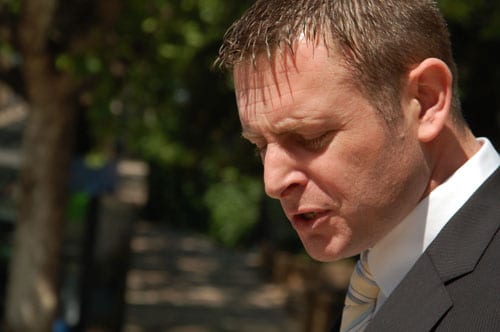Once a land of Ferraris, cocaine and women, it was the flashy destination of choice for the most notorious fugitives of Britain’s underworld. Now, as the arrest of Andrew Moran shows, Spain’s “Costa del Crime” is the worst place to go on the run, reports Colin Freeman.
Since he last gained fame as a brief item in the “Crimewatch” slot of his local television news, a lot has changed for Manchester armed robber Jason Coghlan.
Having broken out of the dock during a court appearance in 1999, he spent a fortnight as one of the North West’s most wanted men before being re-arrested and sentenced to 12 years in Britain’s highest security jails.
Today, though, the man the police warned the public not to approach comes across as very approachable, having turned his back on crime in favour of a new venture in sunny Marbella.
This time he is on the right side of the law – just – acting as a legal “Mr Fixit” to the British criminal fraternity, who complain that a decent Spanish lawyer is as hard to find as a decent Spanish plumber.
“A lot of lawyers out here aren’t good at acting for foreign criminals, and when Brits get arrested they need someone like me to guide them to a decent one,” said Mr Coghlan, 43, whose younger brother, Arran, is nicknamed the “Teflon Don” back in Manchester after three separate attempts to prosecute him for different murders failed.
 Jason Coghlan
Jason Coghlan
“I make sure they’re represented properly and handle the translation issues, but I can also talk the criminal’s language, as it were, because of my background,” Mr Coghlan added.
One potential client for Mr Coghlan now is fellow Mancunian Andrew Moran, 31, who last week became the star of his very own mini-gangster movie when Spanish police released a video of his arrest at the poolside of his villa in Calpe, near Benidorm.
The footage, which received widespread media coverage, showed police creeping up on Mr Moran as he sunbathed, pouncing on him as he vaulted over a garden wall to escape. That it looked like a scene from the Costa-based crime flick Sexy Beast, in which Ray Winstone’s retired villain whiles away life by the pool, was no coincidence. Spanish police, who allegedly discovered two pistols at Moran’s villa, knew that if they grabbed him in his trunks, he was unlikely to be armed.
In the back yard of Moran’s empty villa this weekend, a bottle of Factor 20 suncream was the only remaining sign of his life in the run, which began four years ago with a previous vault from the dock of Burnley Crown Court, when he was on trial for a mail van hold-up. Spanish judges are now debating whether to extradite him to Britain, or try him in Spain, where he faces separate charges of cannabis dealing and ramming two police cars while evading a previous arrest attempt last year.
Yet while Moran’s arrest was hailed as a triumph by British police, who nowadays work much more closely with their Spanish counterparts, it also showed that the “Costa del Crime” is still popular with Britons facing accusations of villainy.
Moran was on a list of no less than 65 “most wanted” issued in the past six years by Operation Captura, the Spanish arm of Britain’s Crimestoppers scheme, which targets suspects thought to be hiding in Spain by distributing leaflets and beer mats with hotline numbers to expat bars. Of that 65, all but 15 have now been arrested. And at the risk of doing himself out of future clients, Mr Coghlan says that other fugitives planning on coming here should think again.
“Quote me on this – Spain is singularly the worst place to go on the run,” he said.

Police capture Andrew Moran in Calpe.
“In the 1970s it was okay because there was no extradition treaty. But nowadays there is lots of police attention, both British and Spanish. You might as well hide in Norfolk. Spain is not an imaginative choice at all, but then again, many villains do not have much imagination.”
It is a far cry from the old days, which Mr Coghlan himself caught the tail end of in the 1990s, when he would regularly head out to Marbella to spend the proceeds of his crimes, blowing tens of thousands of pounds in just a few weeks.
“Back then I felt like a king, and it felt safe to spend money there,” he said. “There was a place where you could hire Ferraris for £600 a day, and the women were experts at parting you from your cash. I loved the birds, and I’d buy them whatever it took – jewellery, clothes whatever – just so we’d look good when out at night.
“But the Spanish police back then were a different breed, and you could still offer them money to get out of serious situations. Act all flash these days, and you’ll soon get into trouble.”
Certainly, Mr Moran appears to have kept a low profile, having had a distinctive mole removed via plastic surgery and swapping his skinhead look for a short-back-and sides and wispy moustache. He also seems to have avoided the expat bars in Calpe’s “English Square” where, apart from a local character named “Pikey Pete”, no-one remembers seeing any villainous types for years.
“Nowadays, those kind of people stay in villas out in the countryside and keep themselves to themselves,” said one drinker, who nonetheless asked not to named.
Making life harder these days is increased airport security, the introduction of the pan-European arrest warrant in 2004, and occasional swoops by Spanish police, who will sometimes do random ID checks in bars frequented by British villains.
Yet many fugitives do still take their chances here, as is evident from a flick through the outstanding Captura wanted list, where the mugshots of Glasgow hardmen, Geordie gangsters and East End enforcers show the modern British underworld at all levels.
At the upper end are current fugitives like David Andrews, 66, accused of running a major cocaine trafficking gang, and Derek “Decco” Ferguson, wanted over a Strathclyde pub carpark shooting in 2007. Further down, meanwhile, are men like alleged heroin dealer Scott Coleman, who, with a distinctive pair of lips tattooed on his buttocks, has presumably had to be more cautious with the ladies than Mr Coghlan was.
So why do they still come? “It’s partly because there is a well established British community there that they can assimilate into very easily,” said Dave Allen, head of the fugitives unit at the Serious and Organised Crime Agency.
“Parts of Spain are basically like south London with sunshine. Having said that, we’ve changed our policing methods a lot in the last 30 years, and nowadays, criminals who move abroad are never off our radar.”
The other attraction is Spain’s prime location in the drug trade, which is now booming more than ever. Cocaine and marijuana is easily trafficked in from North Africa, from where it can then be sold retail on the Costa club scene, or shipped wholesale to Britain. According to some estimates, as many as 30 or 40 British criminal gangs now operate in southern Spain, alongside Dutch, Eastern European and Irish gangs, the latter fleeing recent crackdowns in their Dublin strongholds.
True, increased transport hub security in the post 9/11 era makes airports and ports harder for fugitives. But many use so-called “FOG” passports – or “fraudulently obtained genuine” passports – whereby a criminal will bribe someone for their personal documents and then use them to obtain a legally valid passport.
Once out in Spain, criminals can also usually rely on networks of contacts to help them, said Mr Allen – assuming they are not “too hot to handle”.
But while a large criminal fraternity can help provide a support network, it can also be a problem. Fellow villains are far more likely to recognise fugitives – and give their game away – than ordinary members of the public are.
“The police always call it ‘intelligence’ to make themselves sound intelligent, but when they arrest someone it’s usually just some other villain has informed on them,” said Mr Coghlan.
Which is where his new Marbella-based firm, Jacog Law, comes in.
Specialising in “Spanish to English Criminal Legal Services”, it has gained 28 clients since starting 16 months ago, including a Briton accused of smuggling a tonne of hashish, and a suspected IRA hitman convicted of murdering Daniel Smith, himself a suspected gangster, in a bar near Marbella in 2010. And while Mr Coghlan does not claim to be a lawyer, he does bring considerable practical experience of criminal legal systems, both in Britain and in Spain.
Originally from Stockport, he fell into crime when he was young, being booted out of the Commandos for assault and theft and then becoming involved in car-ringing and robbery. His brother Arran, meanwhile, has been accused three times of the murders of northern gangland figures and also arrested over a large-scale cocaine smuggling plot. He has never been convicted of any of the offences, however, and insists he is a legitimate businessman facing a police vendetta.
After his initial arrest for the 1999 post office robbery, Jason Coghlan escaped from Trafford Magistrates Court, where, having told guards he needed crutches for a leg injury, he threw the crutches away and leaped over the dock. He was then caught in Blackpool a fortnight later, and having been classified as a Category Double AA high-risk prisoner, served his time in maximum security jails like Whitemoor, where he met Britain’s topmost gangsters. Among them was the Brinks Mat bullion handler and road rage killer Kenneth Noye, who himself was arrested in Spain in 1998 after two years on the run.
“I did ask him once why he’d gone to the south of Spain,” said Mr Coghlan. “He said that for people of his generation, it was the only place they really knew.”
Having decided to reform, Mr Coghlan become a jail-house lawyer while inside, advising other prisoners on legal cases and appeals. He got the idea for his current venture, though, after subsequently being thrown in jail in Spain, where he went after his release in Britain to pursue an alleged time-share fraudster who owed his mother money. The man complained to the police, who then arrested Mr Coghlan and held him on remand for 11 months. Worse still, he claims, a lawyer he paid €10,000 to only visited him once.
“It is hard to describe how bad the legal service is out here,” he said.
“While I was in prison I also heard dozens of other complaints about the inefficiencies of lawyers out here, and having learned the hard way, I now want to change that.”
To that end, his firm refers work to a number of favoured legal firms, in return for a percentage of any fees they then charge. Unlike some Spanish legal firms, he says, they will challenge weak police cases rather than simply plea bargaining.
“It is fair to say that a lot of Spanish lawyers take a rather laid back approach,” agreed Antonio Flores, a leading lawyer at Lawbird Legal Services in Marbella, which has had referrals from Mr Coghlan.
True, Mr Coghlan freely admits that his own reputation helps to ensure that nobody trifles with his clients. But he adds: “There is nothing legally wrong with what we do, even if the authorities don’t like it. And I’m not pretending to be a lawyer, I’m just a good case administrator.”
Ironically for a man who now claims to have gone straight, the success of his future venture will, of course, depend on the Costa del Crime continuing to attract villains. As things stand, though, that seems likely – even if they do look over their shoulder rather more often while sitting by the pool.





